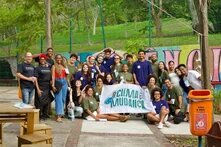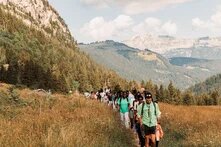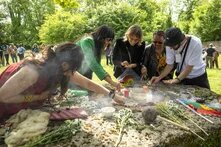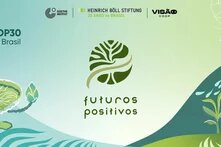Diante de um cenário cada vez mais desanimador para o nosso Planeta, com desafios urgentes – como a crise climática, o aumento das desigualdades sociais, o esgotamento dos recursos naturais e guerras prolongadas – é comum que organizações da sociedade civil, governos e indivíduos passem a desejar respostas efetivas e imediatas, ou mesmo boas ideias que possam ser replicadas como uma receita de bolo. No entanto, problemas complexos demandam soluções igualmente complexas. Nesse contexto, a Fundação Heinrich Böll lança oficialmente, no dia 7 de setembro de 2025, a plataforma Futuros Positivos. A Fundação conta ainda com as parcerias do Instituto Goethe, instituição cultural e de ensino da Alemanha no exterior, e da Visão Coop, organização de jovens da periferia do Rio de Janeiro que trabalham com clima e tecnologia.
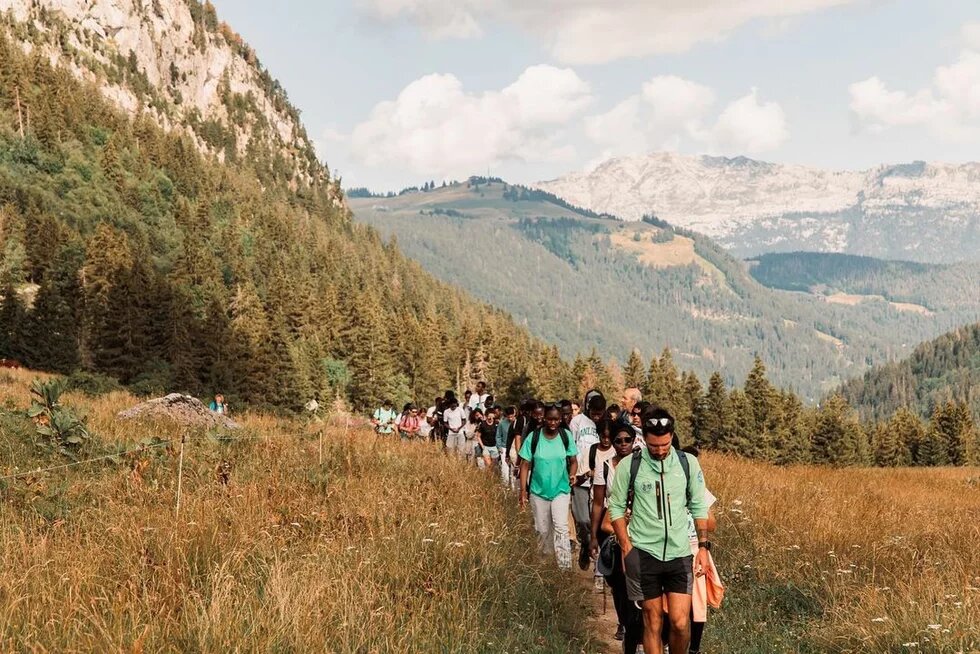
Já parou para pensar que o problema talvez esteja em imaginarmos um futuro promissor baseado em acúmulo de riquezas? Enquanto, na realidade, construir um futuro no qual emergências climáticas estejam sob controle demanda um estilo de vida sustentável, a reestruturação das nossas cidades, sistemas alimentares inteligentes e muitos outros fatores que vão na contramão do consumo desenfreado? Essas perguntas podem soar, nos dias de hoje, ingênuas ou antiquadas, mas há muitas iniciativas de fazer os olhos brilharem pelo mundo e nós queremos compartilhá-las com você.
Muitas das respostas para nossos problemas globais já estão sendo implementadas localmente, em comunidades que, muitas vezes, sequer são reconhecidas nos grandes fóruns internacionais. O projeto Futuros Positivos visa, portanto, conectar essas pessoas e acender os holofotes em direção a essas soluções fundamentadas no conhecimento local de comunidades, cientistas e organizações não-governamentais que compreendem profundamente os desafios de seus territórios.
A iniciativa parte do princípio de que soluções transformadoras já estão em curso nos territórios periféricos — rurais e urbanos — ao redor do mundo. São experiências lideradas por organizações da sociedade civil que apostam na inovação social, na criatividade e inteligência comunitária e na força do conhecimento local para desenhar futuros mais justos, sustentáveis e diversos.
O Projeto Futuros Positivos
O Projeto Futuros Positivos visa mapear, interconectar e dar visibilidade a projetos transformadores ao redor do mundo, através de um mapa interativo com espaço para networking e troca de experiências. Os resultados do projeto serão apresentados a princípio durante a COP30, em Belém do Pará, em novembro de 2025, em espaços oficiais e paralelos, em colaboração com parceiros locais, como a Universidade da Amazônia (UNAMA), a Universidade Federal do Pará (UFPA) e a Cúpula dos Povos.
Também iremos, nos meses que antecederão a COP, apresentar e discutir exemplos relevantes, com foco em construção colaborativa de cenários positivos para o futuro, com a ajuda de um time de especialistas pesquisadores, pensadores e especialistas de diversas partes do mundo. Assim, cenários positivos para o futuro serão explorados do local para o global. Da mesma forma, o mapa interativo de projetos, que será elaborado pela Visão Coop, é essencial para que essas ideias sejam visualizadas e estejam virtualmente acessíveis para um intercâmbio global.
Para Lennon Medeiros, diretor executivo da Visão Coop, o caráter coletivo e colaborativo do projeto é o laço principal entre as duas instituições e a chave para o sucesso do projeto. “A Visão Coop nasceu dos mutirões que transformam vulnerabilidade climática em ação coletiva na Baixada Fluminense, e é justamente essa experiência que nos motiva a criar uma plataforma como Futuros Positivos.” Lennon acredita que “laboratórios que integram ciência cidadã, inteligência coletiva e ação climática — ao conectar comunidades periféricas, pesquisadores e tomadores de decisão — podem fazer emergir soluções eficientes para gestão territorial, produzindo indicadores, culturas e protótipos replicáveis, fortalecendo a resiliência climática de quem mais precisa, como também influenciando políticas públicas globais com dados confiáveis e narrativas inspiradoras.”
Criada em 2020, a Visão Coop é um laboratório que constrói estratégias de adaptação e tecnologias para resiliência climática nas periferias brasileiras.
Um mapa vivo de possibilidades
A proposta do projeto é ambiciosa e profundamente conectada à realidade das bases: mapear, categorizar e dar visibilidade a projetos transformadores de todos os continentes. Para isso, será criado um mapa interativo global, com três camadas geográficas (país, estado e cidade), que permitirá visualizar as iniciativas, acessar informações, vídeos, artigos e até se conectar com outras redes e cenários.
Esse mapeamento respeitará protocolos rigorosos de segurança, como o sigilo de localizações exatas e criptografia de dados, seguindo as normas da Lei Geral de Proteção de Dados. O objetivo não é apenas registrar os projetos, mas também valorizar os seus aspectos únicos, promovendo trocas de saberes e construindo pontes entre diferentes realidades.
Categorias e temas: recortes amplos para conexões entre diferentes áreas
Para facilitar a navegação e análise, as iniciativas serão organizadas em cinco categorias principais – uma divisão prática, mas não rígida, já que muitas experiências dialogam com mais de um campo:
· Agroecologia, alimentos saudáveis e uso da terra
· Economia do cuidado, empreendimento social, estilos de vida sustentáveis e espiritualidade
· Tecnologia, governança e juventude
· Cidades, energia e mobilidade
· Arte, cultura e outros imaginários
Essas categorias ajudam a estruturar o mapeamento, mas o projeto vai além delas. Em uma segunda etapa, serão identificados recortes sociais, políticos, econômicos, culturais e ambientais, além de conexões entre áreas e elementos de convergência entre diferentes territórios. Com isso, será possível criar sinergias e trocas entre iniciativas inovadoras de diferentes países e continentes.
Além disso, por meio da plataforma do Futuros Positivos, será possível trocar ideias, experiências e aumentar a rede de contatos de pessoas que trabalham em diferentes áreas – ou correlatas – fortalecendo a ideia dos objetivos e dos bens comuns. Discutir o comum é pensar em cooperação, em ações coletivas, onde o usofruto do indivíduo é compartilhado com a utilização coletiva; é o fundamento da luta pela diversidade de vidas e da coexistência de humanos e não humanos representadas na natureza. Ou seja, tecnologias sociais e inovações de impacto positivo.
O elemento-chave: o que levar para o futuro?
Um dos principais diferenciais do Futuros Positivos é a busca por "blocos de construção do futuro": componentes essenciais de cada projeto que, segundo seus próprios idealizadores, deveriam ser preservados e levados adiante. Essa reflexão será guiada por uma pergunta-chave: que elemento do seu projeto você levaria para o futuro?
A partir dessas respostas, será possível identificar os valores, práticas e inovações que sustentam essas experiências e que podem servir como base para a criação de cenários futuros positivos – narrativas plausíveis, construídas com base em dados, histórias e mapas, que ajudam a imaginar como o mundo pode evoluir a partir dessas iniciativas.
Benefícios e impacto
Participar do Futuros Positivos é, acima de tudo, uma forma de amplificar vozes e práticas que costumam ser invisibilizadas no debate global. A plataforma permitirá a construção de redes internacionais, possibilitando intercâmbio de experiências, articulação de parcerias e visibilidade política.
Além disso, os projetos mapeados poderão participar dos nossos eventos e webinars durante o ano de 2025 e em novembro durante a COP30, em Belém do Pará – uma oportunidade de colocar, entre outros também os saberes das comunidades periféricas no centro das discussões climáticas mundiais.
A plataforma será dividida em duas camadas. Na primeira, será possível ler e visualizar os resultados dos estudos do grupo de especialsitas que estão desenvolvendo os cenários para o futuro. A segunda será uma área de intercâmbios para os projetos cadastrados, que, por meio de login e senha, terão acesso aos anúncios e a informações mais detalhadas sobre as outras organizações ou movimentos pelo mundo.
Para além do reconhecimento
Segundo Regine Schönenberg, diretora da Fundação Heinrich Böll no Brasil, o Futuros Positivos representa uma aposta na potência dos movimentos de base e grupos minoritários. “Acreditamos muito nas soluções criadas pelas comunidades tradicionais e periféricas e dos diversos ativistas que apoiamos, pois são elas quem realmente conhece os desafios e soluções cotidianas”, afirma. Ela destaca ainda a importância de inverter a lógica tradicional de desenvolvimento, valorizando as trocas que partem do local para o global.
“Vejo neste reconhecimento da força das bases uma das poucas saídas para uma humanidade sacudida por tantas tragédias anunciadas.”
Regine Schönenberg, diretora da Fundação Heinrich Böll no Brasil.
O Futuros Positivos é mais do que um mapa ou uma base de dados: é uma plataforma viva de construção de cenários, um convite à escuta e à colaboração global. Ao reconhecer que a inovação nasce também (e sobretudo) nas margens, o projeto abre caminho para um futuro onde diversidade, justiça e sustentabilidade não sejam exceções, mas fundamentos primordiais para o futuro da Terra.
Quer saber mais sobre o projeto ou enviar ideias de atividades, processos ou projetos para o Futuros Positivos?
Entre em contato: leonardo.montel@br.boell.org ou através do link.
